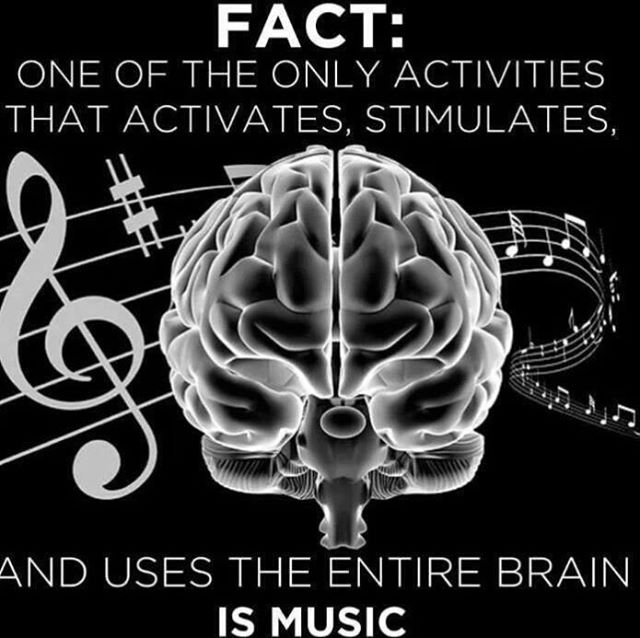|
By PERRI KLASS, M.D.Joyce Hesselberth When children learn to play a musical instrument, they strengthen a range of auditory skills. Recent studies suggest that these benefits extend all through life, at least for those who continue to be engaged with music. But a study published last month is the first to show that music lessons in childhood may lead to changes in the brain that persist years after the lessons stop. Researchers at Northwestern University recorded the auditory brainstem responses of college students — that is to say, their electrical brain waves — in response to complex sounds. The group of students who reported musical training in childhood had more robust responses — their brains were better able to pick out essential elements, like pitch, in the complex sounds when they were tested. And this was true even if the lessons had ended years ago. Indeed, scientists are puzzling out the connections between musical training in childhood and language-based learning — for instance, reading. Learning to play an instrument may confer some unexpected benefits, recent studies suggest. We aren’t talking here about the “Mozart effect,” the claim that listening to classical music can improve people’s performance on tests. Instead, these are studies of the effects of active engagement and discipline. This kind of musical training improves the brain’s ability to discern the components of sound — the pitch, the timing and the timbre. “To learn to read, you need to have good working memory, the ability to disambiguate speech sounds, make sound-to-meaning connections,” said Professor Nina Kraus, director of the Auditory Neuroscience Laboratory at Northwestern University. “Each one of these things really seems to be strengthened with active engagement in playing a musical instrument.” Skill in appreciating the subtle qualities of sound, even against a complicated and noisy background, turns out to be important not just for a child learning to understand speech and written language, but also for an elderly person struggling with hearing loss. In a study of those who do keep playing, published this summer, researchers found that as musicians age, they experience the same decline in peripheral hearing, the functioning of the nerves in their ears, as nonmusicians. But older musicians preserve the brain functions, the central auditory processing skills that can help you understand speech against the background of a noisy environment. “We often refer to the ‘cocktail party’ problem — or imagine going to a restaurant where a lot of people are talking,” said Dr. Claude Alain, assistant director of the Rotman Research Institute in Toronto and one of the authors of the study. “The older adults who are musically trained perform better on speech in noise tests — it involves the brain rather than the peripheral hearing system.” Researchers at the University of California, San Francisco, are approaching the soundscape from a different point of view, studying the genetics of absolute, or perfect, pitch, that ability to identify any tone. Dr. Jane Gitschier, a professor of medicine and pediatrics who directs the study there, and her colleagues are trying to tease out both the genetics and the effects of early training. “The immediate question we’ve been trying to get to is what are the variants in people’s genomes that could predispose an individual to have absolute pitch,” she said. “The hypothesis, further, is that those variants will then manifest as absolute pitch with the input of early musical training.” Indeed, almost everyone who qualifies as having truly absolute pitch turns out to have had musical training in childhood (you can take the test and volunteer for the study at http://perfectpitch.ucsf.edu/study/. Alexandra Parbery-Clark, a doctoral candidate in Dr. Kraus’s lab and one of the authors of a paper published this year on auditory working memory and music, was originally trained as a concert pianist. Her desire to go back to graduate school and study the brain, she told me, grew out of teaching at a French school for musically talented children, and observing the ways that musical training affected other kinds of learning. “If you get a kid who is maybe 3 or 4 years old and you’re teaching them to attend, they’re not only working on their auditory skills but also working on their attention skills and their memory skills — which can translate into scholastic learning,” she said. Now Ms. Parbery-Clark and her colleagues can look at recordings of the brain’s electrical detection of sounds, and they can see the musically trained brains producing different — and stronger — responses. “Now I have more proof, tangible proof, music is really doing something,” she told me. “One of my lab mates can look at the computer and say, ‘Oh, you’re recording from a musician!’ ” Many of the researchers in this area are themselves musicians interested in the plasticity of the brain and the effects of musical education on brain waves, which mirror the stimulus sounds. “This is a response that actually reflects the acoustic elements of sound that we know carry meaning,” Professor Kraus said. There’s a fascination — and even a certain heady delight — in learning what the brain can do, and in drawing out the many effects of the combination of stimulation, application, practice and auditory exercise that musical education provides. But the researchers all caution that there is no one best way to apply these findings. Different instruments, different teaching methods, different regimens — families need to find what appeals to the individual child and what works for the family, since a big piece of this should be about pleasure and mastery. Children should enjoy themselves, and their lessons. Parents need to care about music, not slot it in as a therapeutic tool. “We want music to be recognized for what it can be in a person’s life, not necessarily, ‘Oh, we want you to have better cognitive skills, so we’re going to put you in music,’ ” Ms. Parbery-Clark said. “Music is great, music is fantastic, music is social — let them enjoy it for what it really is.” This post has been revised to reflect the following correction: Correction: September 11, 2012 A previous version of this post contained an incorrect hyperlink for a paper by Alexandra Parbery-Clark. A version of this article appeared in print on 09/11/2012, on page D6 of the New York edition with the headline: Brain Waves Stay Tuned to Early Lessons. CONDOLEEZZA RICE trained to be a concert pianist. Alan Greenspan, former chairman of the Federal Reserve, was a professional clarinet and saxophone player. The hedge fund billionaire Bruce Kovner is a pianist who took classes at Juilliard.
Multiple studies link music study to academic achievement. But what is it about serious music training that seems to correlate with outsize success in other fields? The connection isn’t a coincidence. I know because I asked. I put the question to top-flight professionals in industries from tech to finance to media, all of whom had serious (if often little-known) past lives as musicians. Almost all made a connection between their music training and their professional achievements. The phenomenon extends beyond the math-music association. Strikingly, many high achievers told me music opened up the pathways to creative thinking. And their experiences suggest that music training sharpens other qualities: Collaboration. The ability to listen. A way of thinking that weaves together disparate ideas. The power to focus on the present and the future simultaneously. Will your school music program turn your kid into a Paul Allen, the billionaire co-founder of Microsoft (guitar)? Or a Woody Allen (clarinet)? Probably not. These are singular achievers. But the way these and other visionaries I spoke to process music is intriguing. As is the way many of them apply music’s lessons of focus and discipline into new ways of thinking and communicating — even problem solving. Look carefully and you’ll find musicians at the top of almost any industry. Woody Allen performs weekly with a jazz band. The television broadcaster Paula Zahn (cello) and the NBC chief White House correspondent Chuck Todd (French horn) attended college on music scholarships; NBC’s Andrea Mitchell trained to become a professional violinist. Both Microsoft’s Mr. Allen and the venture capitalist Roger McNamee have rock bands. Larry Page, a co-founder of Google, played saxophone in high school. Steven Spielberg is a clarinetist and son of a pianist. The former World Bank president James D. Wolfensohn has played cello at Carnegie Hall. “It’s not a coincidence,” says Mr. Greenspan, who gave up jazz clarinet but still dabbles at the baby grand in his living room. “I can tell you as a statistician, the probability that that is mere chance is extremely small.” The cautious former Fed chief adds, “That’s all that you can judge about the facts. The crucial question is: why does that connection exist?” Paul Allen offers an answer. He says music “reinforces your confidence in the ability to create.” Mr. Allen began playing the violin at age 7 and switched to the guitar as a teenager. Even in the early days of Microsoft, he would pick up his guitar at the end of marathon days of programming. The music was the emotional analog to his day job, with each channeling a different type of creative impulse. In both, he says, “something is pushing you to look beyond what currently exists and express yourself in a new way.” Mr. Todd says there is a connection between years of practice and competition and what he calls the “drive for perfection.” The veteran advertising executive Steve Hayden credits his background as a cellist for his most famous work, the Apple “1984” commercial depicting rebellion against a dictator. “I was thinking of Stravinsky when I came up with that idea,” he says. He adds that his cello performance background helps him work collaboratively: “Ensemble playing trains you, quite literally, to play well with others, to know when to solo and when to follow.” For many of the high achievers I spoke with, music functions as a “hidden language,” as Mr. Wolfensohn calls it, one that enhances the ability to connect disparate or even contradictory ideas. When he ran the World Bank, Mr. Wolfensohn traveled to more than 100 countries, often taking in local performances (and occasionally joining in on a borrowed cello), which helped him understand “the culture of people, as distinct from their balance sheet.” It’s in that context that the much-discussed connection between math and music resonates most. Both are at heart modes of expression. Bruce Kovner, the founder of the hedge fund Caxton Associates and chairman of the board of Juilliard, says he sees similarities between his piano playing and investing strategy; as he says, both “relate to pattern recognition, and some people extend these paradigms across different senses.” Mr. Kovner and the concert pianist Robert Taub both describe a sort of synesthesia — they perceive patterns in a three-dimensional way. Mr. Taub, who gained fame for his Beethoven recordings and has since founded a music software company, MuseAmi, says that when he performs, he can “visualize all of the notes and their interrelationships,” a skill that translates intellectually into making “multiple connections in multiple spheres.” For others I spoke to, their passion for music is more notable than their talent. Woody Allen told me bluntly, “I’m not an accomplished musician. I get total traction from the fact that I’m in movies.” Mr. Allen sees music as a diversion, unconnected to his day job. He likens himself to “a weekend tennis player who comes in once a week to play. I don’t have a particularly good ear at all or a particularly good sense of timing. In comedy, I’ve got a good instinct for rhythm. In music, I don’t, really.” Still, he practices the clarinet at least half an hour every day, because wind players will lose their embouchure (mouth position) if they don’t: “If you want to play at all you have to practice. I have to practice every single day to be as bad as I am.” He performs regularly, even touring internationally with his New Orleans jazz band. “I never thought I would be playing in concert halls of the world to 5,000, 6,000 people,” he says. “I will say, quite unexpectedly, it enriched my life tremendously.” Music provides balance, explains Mr. Wolfensohn, who began cello lessons as an adult. “You aren’t trying to win any races or be the leader of this or the leader of that. You’re enjoying it because of the satisfaction and joy you get out of music, which is totally unrelated to your professional status.” For Roger McNamee, whose Elevation Partners is perhaps best known for its early investment in Facebook, “music and technology have converged,” he says. He became expert on Facebook by using it to promote his band, Moonalice, and now is focusing on video by live-streaming its concerts. He says musicians and top professionals share “the almost desperate need to dive deep.” This capacity to obsess seems to unite top performers in music and other fields. Ms. Zahn remembers spending up to four hours a day “holed up in cramped practice rooms trying to master a phrase” on her cello. Mr. Todd, now 41, recounted in detail the solo audition at age 17 when he got the second-highest mark rather than the highest mark — though he still was principal horn in Florida’s All-State Orchestra. “I’ve always believed the reason I’ve gotten ahead is by outworking other people,” he says. It’s a skill learned by “playing that solo one more time, working on that one little section one more time,” and it translates into “working on something over and over again, or double-checking or triple-checking.” He adds, “There’s nothing like music to teach you that eventually if you work hard enough, it does get better. You see the results.” That’s an observation worth remembering at a time when music as a serious pursuit — and music education — is in decline in this country. Consider the qualities these high achievers say music has sharpened: collaboration, creativity, discipline and the capacity to reconcile conflicting ideas. All are qualities notably absent from public life. Music may not make you a genius, or rich, or even a better person. But it helps train you to think differently, to process different points of view — and most important, to take pleasure in listening. Joanne Lipman is a co-author, with Melanie Kupchynsky, of the book “Strings Attached: One Tough Teacher and the Gift of Great Expectations.” Lindley Sixth Grade Academy Bands
Dr. I. Denise Magee, Principal 1550 Pebblebrook Circle Mableton, Georgia 30126 Phone: 770-819-2414 April 8, 2019 On Tuesday, May 7th, 2019, the 6th grade band will perform a Spring Concert in the Lindley Sixth Grade Academy Gymnasium. The band will perform at 6:30pm. If your student needs to stay after school until the concert, we will order pizza and drinks and eat in the cafeteria (the students do not have to pay). The dress for the concert is (standard dress attire): Khaki slacks/pants Black socks Black, brown, or white shoes Black belt Dark blue shirt with collar If the student is not in concert dress attire, he/she will not be able to perform. Thank you for all your help and support. If you would like to be a chaperone, the chaperones need to be at school at 4:00pm to assist with pizza/drinks and student needs. I would greatly appreciate having parents as chaperones to help. Students can stay after school and have pizza and drinks in the cafeteria. Please check yes on the permission slip (or send an email), if you would like to be a chaperone. If you have any questions you can call the school at 770-819-2414. We look forward to see you on May 7th!! Musically yours, James A. Smart email: [email protected] Please check: Yes, I would like to chaperone _____________ Signatures of parent(s) or guardian(s): Phone Number(s): Email: _____________________________________________________________ |
LSGA Instrumental Ensembles-
|



 RSS Feed
RSS Feed
